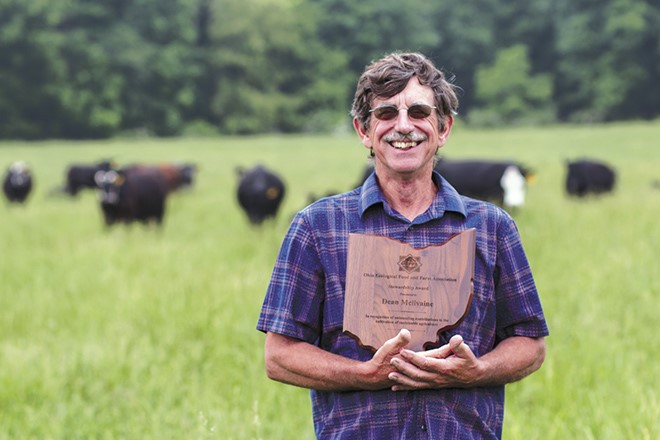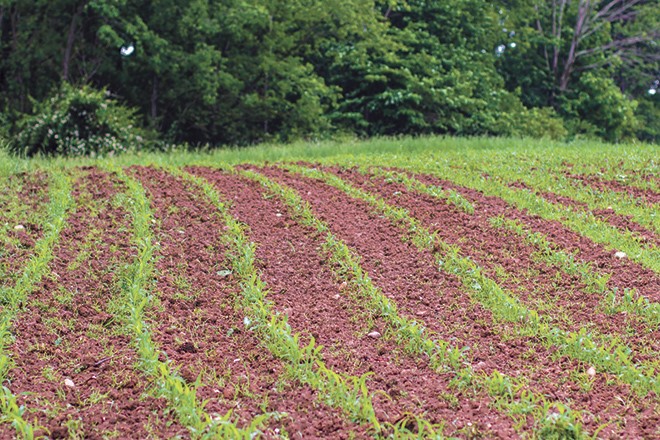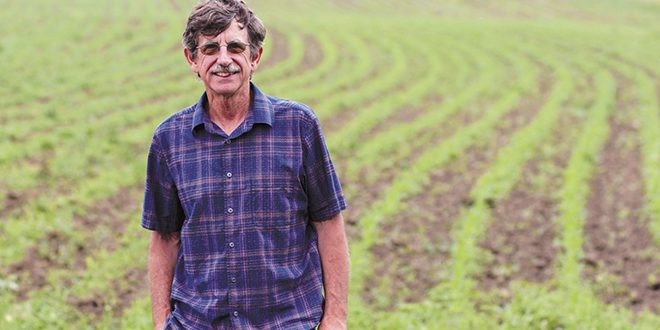By Brianna Gwirtz, Ohio’s Country Journal field reporter
In 1973, a young Dean McIlvaine was plagued by the problems caused by the energy crisis. The crisis was causing gas prices to skyrocket and fuel shortages were abundant. McIlvaine often thought about alternatives to using fossil fuel, something that would be better for the planet.
A problem solver by nature, McIlvaine has always been intrigued by possible solutions to modern day problems.
McIlvaine carried that curiosity into his adult life. In college at Grinnell University in Iowa, he studied economics and policy. McIlvaine was also exposed to organic agriculture during his time in Iowa at school.
“The idea of organic food production really resonated with me and blossomed. I tried to invoke change through politics. I had worked in Washington, D.C. for a stint, writing a proposal for organic education and research for the 1979 Farm Bill. However, I became more interested in practical applications. After college I joined the Peace Corps to learn more about sustainable agriculture,” McIlvaine said.
His time in the Peace Corps lead him to Paraguay for a while before he returned home to the family farm in northeast Ohio. His dad, Dale McIlvaine, owned McIlvaine Equipment in Wooster, a tractor dealership. In the mid-1970s he purchased Twin Park Farms. Situated right off Interstate 71, the farm was named after the two rest stop areas that are surrounded by the farm’s fields.
“When I returned home, my dad was more than happy to turn over some of the farming responsibilities to me and focus more on the dealership,” McIlvaine said.
Shortly after returning home in the early ‘80s, McIlvaine was introduced to the newly created Ohio Ecological Food and Farm Association (OEFFA). At that time, there were no national guidelines for organic food production. The federal government relied on state organizations to determine qualifications and guidelines.
“We farmed conventionally until I took the dive to switch to organic production. We harvested our first certified organic crop in 1988,” McIlvaine said. “During that time, there was a movement to standardize the organic industry. The national organic program was finally founded in 1990. So, I’ve been part of the organic industry since the ‘official’ beginning.”
The transition to organic was both a moral and financial decision. McIlvaine always felt a strong aversion to chemicals. His father, Dale, passed away at the age of 62 from non-Hodgkin’s lymphoma due to chemical exposure, only solidifying McIlvaine’s opinion.
The ‘80s were difficult for many farmers and agriculture in general. Farm prices were high, grain prices were low, and drought affected the region. However, the decision to transition to organic paid off at the right time.
“I like to call my first crop beginner’s luck,” he said. “The demand for organic soybeans for soy milk and food-grade soybeans for export was very high at the time, so I was very fortunate to sell into a lucrative market. It was perhaps a cost-cutting measure that had great success.”
From there, McIlvaine began diversifying his crops. Today his farm consists of 850 tillable acres, where McIlvaine grows food-grade soybeans for export, organic corn, rye, and hay. His products are consumed both locally and globally. McIlvaine sells grain to Western Reserve Distillers, a certified organic distillery in Cleveland, while most of his soybeans go to Japan for tofu production.
Most recently, McIlvaine added 60-head of beef cows in 2014. The herd grazes 200 acres of pasture, consisting of an assortment of grasses and clovers. McIlvaine also planted plots of trees in the pastures in 1986, creating both a livestock and wildlife haven. The cattle, which he jokingly refers to as his “red, white and blue” herd are mostly crossbred between Angus and Shorthorn. He markets the calves to local feeders.
Over the length of his farming career, McIlvaine has tried a little bit of everything. He’s always felt a calling to go deeper into food production.
“At one point I was operating my own flour mill and selling to bakeries. I also used to raise heritage breed hogs on pasture. We have a grain cleaner and dehulling machine too. In recent years I’ve done custom grain drying for mostly local Amish families,” McIlvaine said. “We’ve made a lot of progress to the farm in the last 40 years. Early soil tests showed low organic matter levels below 2. Today they are healthy, well above 2.5. We soil test every three years to check.”
Through all the years since he was able to do so, McIlvaine has renewed his organic certification annually. Because he cannot use synthetic chemicals on his crops, he has used a wide variety of minerals, biologics, and enzymes for fertilizers. Weed management requires more labor-intense work.
“Weeds are the bane of every farmer’s existence, but especially to an organic farmer who can’t use chemicals,” McIlvaine said. “We do more tillage, more crop rotation, and incorporate cover crops; rye or clover are our favorites, but we’ve tried a variety of things. We are typically doing something in the fields eight to 10 times a year, whether that’s plant preparation, rotary hoeing, planting, cultivating, or harvesting.”

- Dean McIlvaine with his 2022 Stewardship Award from the OEFFA.
McIlvaine’s dedication and lengthy career in the organic industry earned him the 2022 Stewardship Award from the OEFFA. The award winner is chosen by former award recipients. McIlvaine was very humbled to be this year’s winner.
“We are pleased to recognize Dean with this award,” said Carol Goland, executive director of OEFFA. “For more than 40 years, he has been a great ambassador for organics in Ohio, generously sharing his knowledge, encouraging others, and demonstrating through his own labors what a successful organic farm can accomplish.”
McIlvaine has been very involved with the organization throughout his career. He’s hosted farm tours, attended numerous conferences, lobbied for sustainable agriculture policy, and wrote op-eds for the Cleveland Plain Dealer. McIlvaine was also a member of the Organic Farming Research Foundation and OEFFA boards, and is a member of OEFFA’s Grain Growers Chapter and the Ohio Farmers Union.
“My favorite part about farming is just doing what I love. I like to try new things and tackle challenges. There are always the joys of working in nature as well,” McIlvaine said. “Organic agriculture needs to be upheld to high standards. There are always new actors trying to undermine the organic label, through marketing or other avenues. It’s a never-ending battle to protect the tenants of organic agriculture.”
After farming for most of his life, McIlvaine is nearing retirement. The last few years he’s been leasing some of his fields to local young farmers. He’s still managing a few fields but hopes to eventually transition them all to tenants.
“My biggest lesson and piece of advice I’d give to other farmers wanting to get started in organic farming would be to not count your chickens before they hatch,” McIlvaine said. “With every success, there’s also failure. Just count your blessings.”
Retirement won’t change McIlvaine’s passion for the organic industry. His own personal beliefs are deeply rooted in doing what’s right for the planet and all who inhabit it.
“In general, I like to think that it’s everyone’s efforts that contribute to the whole. That being part of a bigger organization that’s doing good things for people’s health, the health of the planet and the health of our soil and water is very important,” he said. “It’s nice to think I’m helping to be part of the solution, rather than part of the problem.”

This article was reprinted with permission of Ohio’s Country Journal
To view original article, visit:
https://ocj.com/2022/07/celebrating-a-career-of-dedication-to-organic-farming/
Organic & Non-GMO Insights August 2022









